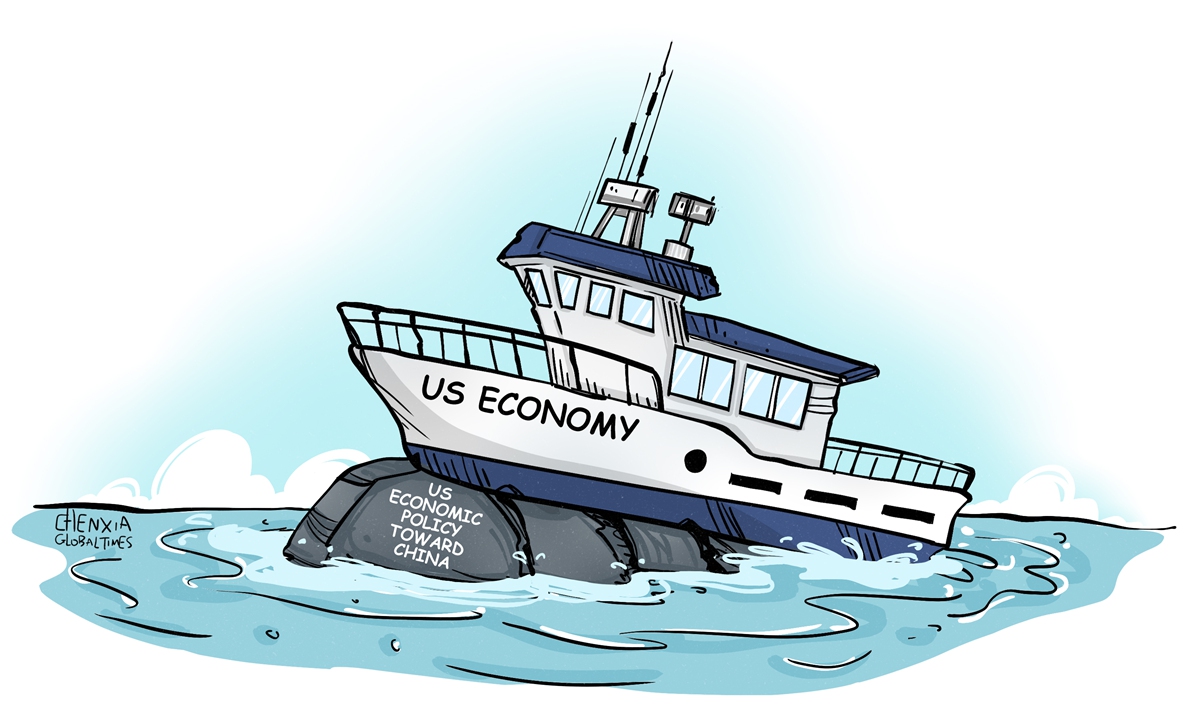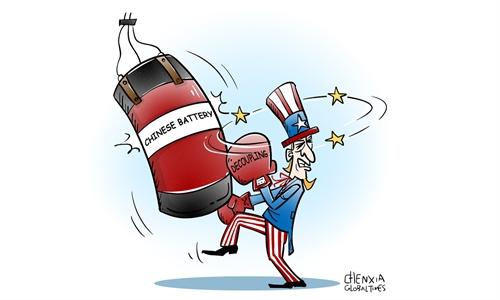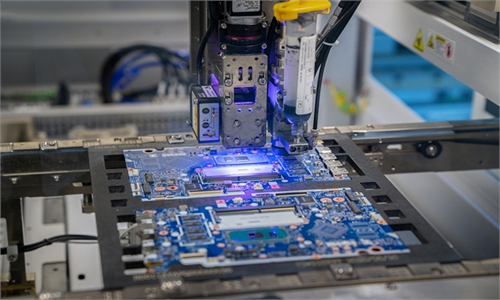
Illustration: Chen Xia/Global Times
US President Joe Biden, delivering his annual State of the Union address to Congress recently, announced that his administration wants "competition with China, not conflict." He boasted his policies for contributing to the US having the "best economy" in the world, contrasting them with what he described as the only "tough talk" on China from his predecessor. He even declared that "America is rising" under his leadership.However, the reality is that Biden's economic policies toward China have been more biased, blatant and coercive, ultimately causing more harm to America in the long run.
Over the past three years, senior US government officials from various departments have actively criticized and condemned China, placing numerous Chinese high-tech companies and higher education institutions under the Entity List in the Biden administration's restless and desperate attempt to stymie China's tech advance and drag down China's economic growth.
The administration's attacks on Chinese businesses and assets have gotten uglier lately, as it slings mud at giant cargo cranes at US ports, claiming they are "Trojan Horses" made by China which might "steal port secrets."
In contrast, many Chinese provinces and cities are courting foreign companies, including Apple and Tesla, to expand their investment and operations in the country.
Compared to China's embrace of foreign investors as well as their products and services, under Beijing's flagship opening-up policy and globally inclusive, win-win and well shared development philosophy, the US government's "small yard, high fence" policy to exclude China from America's tech supplies is egomaniacal. It's guided by the sole selfish aim to hold back China's growth.
To amplify the administration's blinkered mind-set and zero-sum thinking, US senior officials have been on a persuasion campaign, flying worldwide in the past three years to coerce and intimidate its allies to form the US-led bloc and coalition to oppose and impede China.
To obstruct China's technology progress in producing high-end semiconductor chips, the US government has succeeded in persuading Japan and the Netherlands to restrict exports of premium chip-manufacturing machines and related materials to China. It has also forbidden Nvidia from selling high-end GPUs used for running generative AI models to Chinese companies.
The reckless assault on China may slow down China's growth for a temporary period, but it cannot decimate technology innovation and progress by Chinese enterprises. The ingenuous creativity of the Chinese people is unstoppable. Huawei's extraordinary innovation capability and new tech spurts after it was placed on the US Entity List in 2019, is exemplary and inspirational for other Chinese companies to ramp up research and development.
It also explains the rationale why US' economic policies toward China are biased, self-destructive and will hurt the US fundamentally. From the surface, everyone could see it is costly to debunk Huawei's 5G gear in vast rural areas of America, remove bulk cargo cranes made by Shanghai Zhenhua Heavy Industries Co, or obstruct import of cheap and efficient Chinese EVs and solar panels. To the core, America's future competitiveness is being dented, as protectionism always leads to backwardness. Vast American people will have to pay for expensive goods, internet connection fees, EVs and more, while America's green transformation stalls.
There exist some somber and clear minds in the US. According to this group, instead of trying to compete on a level playing ground, the US government's response to China's manufacturing rise is to try to restrict Chinese firms so they can't produce these things, which will inevitably cause China to develop those components and technologies in-house. For example, China's output of semiconductor chips just boomed in 2023, which shows the country's painstaking efforts to create advanced chips is well on track despite US export controls.
China's development is all-around and inclusive on a global level, with its trade with the Global South economies steadily rising in the past years, making up a significant part of China's foreign trade, which reinforces both China and its partners. Despite the "decoupling" push by the US and its allies, China's exports of goods still recorded 10.3 percent growth in the first two months this year.
The reason why China's manufactured goods remain highly popular among consumers around the world is due to their affordability and good quality. Chinese enterprises have invested heavily in innovation and they also developed highly efficient manufacturing procedures and highly skilled workers as well. Consumers worldwide appreciate the opportunity to purchase high-quality products at low prices from China. The strategies employed by China to enhance its manufacturing capabilities are commendable rather than condemnable.
The imposition of tariffs on Chinese goods by Washington only serves to escalate the cost of these goods, making them less affordable for America's middle-class workers and harming the poor. Exploiting xenophobia for political ends by Washington is easy, but figuring out how to effectively cooperate and fairly compete with China is much harder. China is willing to strengthen dialogue and communication with the US, and believes that the two nations can find a workable way to coexist peacefully.
The author is an editor with the Global Times. bizopinion@globaltimes.com.cn



